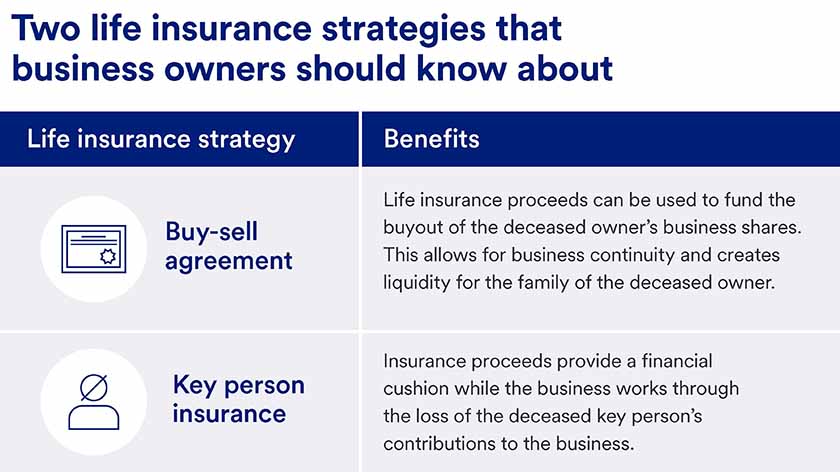
Key takeaways
Life insurance for business owners plays an important role in business continuity if you or your partner dies prematurely.
Life insurance policies can be designed with buy-sell or key person coverage in mind.
Whether you choose a term policy or a permanent policy depends on your goals and the policy’s place in your business’ financial plan.
Life insurance provides financial security for your family if you were to die prematurely. When you’re a business owner, however, there are more people counting on you. For everyone involved, from your business partners to your employees, a life insurance policy can play a pivotal role in the continuity of your business.
“More often than not, people are the largest asset in a company,” says Jacob Kujala, senior product manager for U.S. Bancorp Investments. “As a business owner, there’s an important financial dynamic to your value. Having life insurance makes a lot of business sense.”
There are some key considerations to keep in mind when selecting the best life insurance approach for your business. For example, a new U.S. Supreme Court ruling may affect the way life insurance is factored into business valuations and buy-sell agreements, depending on how the insurance coverage and policy are structured.
Types of life insurance for business owners
Tom Nicoski, senior vice president and product manager for U.S. Bancorp Investments, says life insurance for business owners provides two main benefits.
Buy-sell agreement life insurance
“A buy-sell agreement is beneficial if a business owner has a partner and would prefer not to work with the partner’s family members if the partner passes away prematurely,” Nicoski says. “Life insurance proceeds can be used to purchase the business shares from the deceased partner’s estate.”
In June 2024, the U.S. Supreme Court unanimously affirmed the 8th Circuit of Appeals ruling in Connelly vs. U.S. that life insurance proceeds paid to a business inflate the fair market value of the company, and that the entities’ obligation to redeem the shares from the deceased owner’s estate do not reduce the business’ value. For estate tax purposes, the deceased business owner’s interest is increased by the life insurance proceeds received by the business in proportion to the owner’s percentage ownership.
This ruling affects entity redemption strategies that business owners typically use and, in particular, those strategies by which the company itself is the owner and beneficiary of the life insurance. Whether multiple owners are involved, when they die and how their ownership percentages are structured will also come into play. Business owners using these types of buy-sell strategies should work with their insurance and tax planning advisors to determine the effects of the new ruling on their personal estate planning.
“This is something that business owners will want to address sooner rather than later, and particularly if any buy-sell agreements were set up long ago and put in a drawer, so to speak,” Nicoski says. “Many business owners don't revisit those policies or the valuation of their business until something happens or until a professional asks them about it.”
Key person life insurance
Life insurance can also be used to provide cash for the business if a key person were to pass away. “The insurance proceeds provide a financial cushion while the business works through the loss of the individual’s contributions to the business,” Nicoski says.
While business owners often purchase life insurance for buy-sell and key person reasons, Kujala says policies with those specific names don’t exist. “Key person and buy-sell agreements are risk mitigation and succession planning strategies that use traditional forms of life insurance,” he explains. “We’re often asked about the availability of buy-sell insurance, which is actually just life insurance used to fund the obligation on a buy-sell agreement.”
“As a business owner, there’s an important financial dynamic to your value. Having life insurance makes a lot of business sense.”
Jacob Kujala, senior product manager, U.S. Bancorp Investments
In many cases, companies will use term insurance, but sometimes permanent insurance (see the following section) makes most sense. The key factors to consider include the purpose of the insurance and how that insurance is owned. As stated above, any insurance that’s owned by the company may be affected by the new Connelly vs. U.S. ruling.
Owners can purchase a policy that funds a specific outcome they’re trying to achieve or can potentially use a policy to fund multiple objectives. For example, the company may take out a policy that includes key person insurance for $1,000,000. Three quarters of that policy could be used to offset the financial loss to the business if the employee passes away, while the remainder could go to the key person’s spouse as a salary continuation.
Should business owners go with a term policy or permanent policy?
You’ll need to choose between a term policy that covers a certain period or a permanent policy that has a cash value aspect to it. Deciding which is best will depend on several factors – most importantly, the policy’s intended use. Other factors include the business’ cash flow, total amount of coverage desired, and the age and health of the insureds.
Permanent insurance policies have several benefits for long-term planning. “The business might use a permanent policy as a vehicle to grow cash value that can be used down the road as a bonus for a partner or for future projects,” Nicoski says.
Permanent policies also offer tax advantages. “Unlike other investments that can be owned by a business, life insurance enjoys tax-advantaged growth and distributions,” Kujala says. “Cash value that grows inside of a policy is tax deferred. When money is distributed from the policy, the beneficiary can access the cost basis first and the gain afterward. And if they take the gain out as a loan, that is not taxable. If taking policy loans above cost basis, it’s important to monitor the policy against lapse to maintain the tax efficiencies.”
Term insurance policies, on the other hand, are often used for buy-sell arrangements in the early stages of a company’s existence, Nicoski says. “Term policies are the least expensive way to insure an individual for a set period of time, allowing business owners to reinvest revenue back into the business during its growth years.”
Other considerations for life insurance for business owners
Riders
Policies can include riders such as death benefit accelerations for long-term care or disability waiver of premium. With the long-term care rider, a policy owner can use policy death benefits while living to help offset the cost of chronic care. With disability waiver of premium, all or a portion of the insurance policy’s costs can be waived to reduce expenditures while still allowing for needed insurance coverage.
Beneficiaries
Kujala suggests that business owners work with tax and legal advisors when choosing beneficiaries. “For key person policies, the business is going to want to be the owner of the policy,” he says.
In other situations, like buy/sell planning, the partner(s), the business itself or a trust could be the owners and/or beneficiaries of the policy. “Without proper ownership and accounting, you can lose one of the biggest benefits for life insurance and the death benefit could become taxable. It’s important to get tax and legal professionals involved,” Kujala adds.
Buy-sell value
The appropriate face amount of your policy is generally determined by the strategy for which you're using it. Nicoski says if you're creating a buy-sell agreement, you'll need to get a business valuation. “Have the valuation done regularly,” he says. “When you start your business, it may be worth a million dollars. Five years later, the business could be worth four million. You’ll want to get more coverage.”
Key person value
Nicoski suggests determining the financial impact the person provides the business as well as the amount of time it would take to replace that individual.
Both Nicoski and Kujala say that consulting a financial advisor can help you navigate the process. “An advisor can open up different discussions and identify risks that the business owner might not have been thinking about,” says Kujala. “Trusted advisors, CPAs, and attorneys can help strategize concepts that address those risks. The advisor is uniquely qualified to help the owner determine the policy type that best matches up with the strategy. They may also help the business owner find the premium dollars to fund their policies, too.”
Would your business benefit from life insurance? Learn about life insurance options from U.S. Bancorp Investments.
Tags:
Explore more
Term vs. permanent life insurance: Which is right for you?
Life insurance can ensure your loved ones will be financially protected after you die, but there are many types to consider. Review term vs. permanent life insurance and the stipulations of each.
Insurance coverage for what matters most.
Insurance protection from U.S. Bancorp Investments can help you, your family or your business feel more prepared, no matter what lies ahead.



